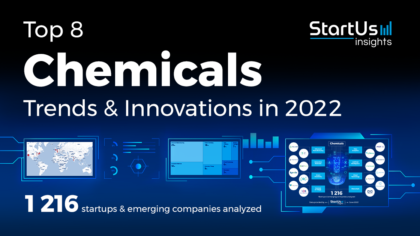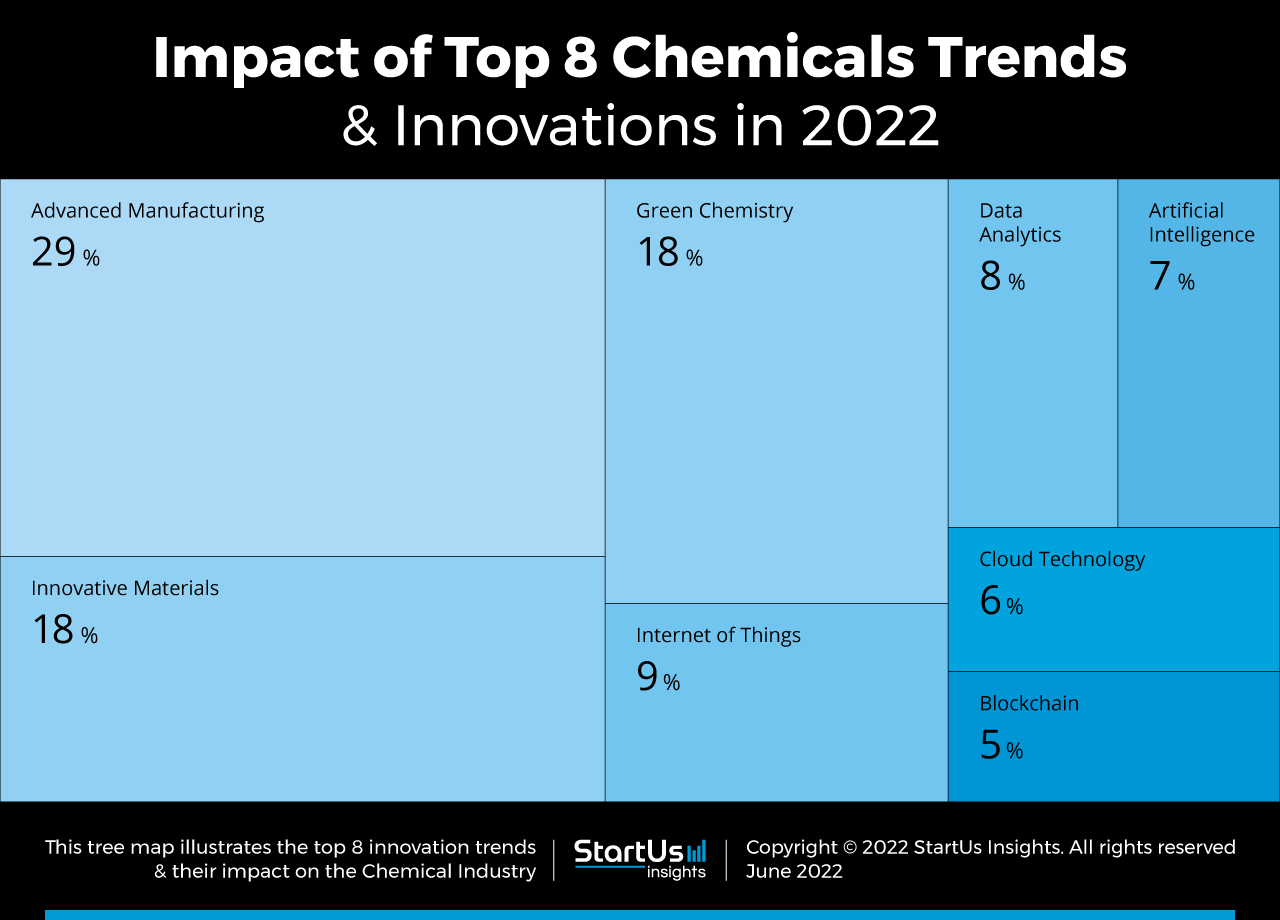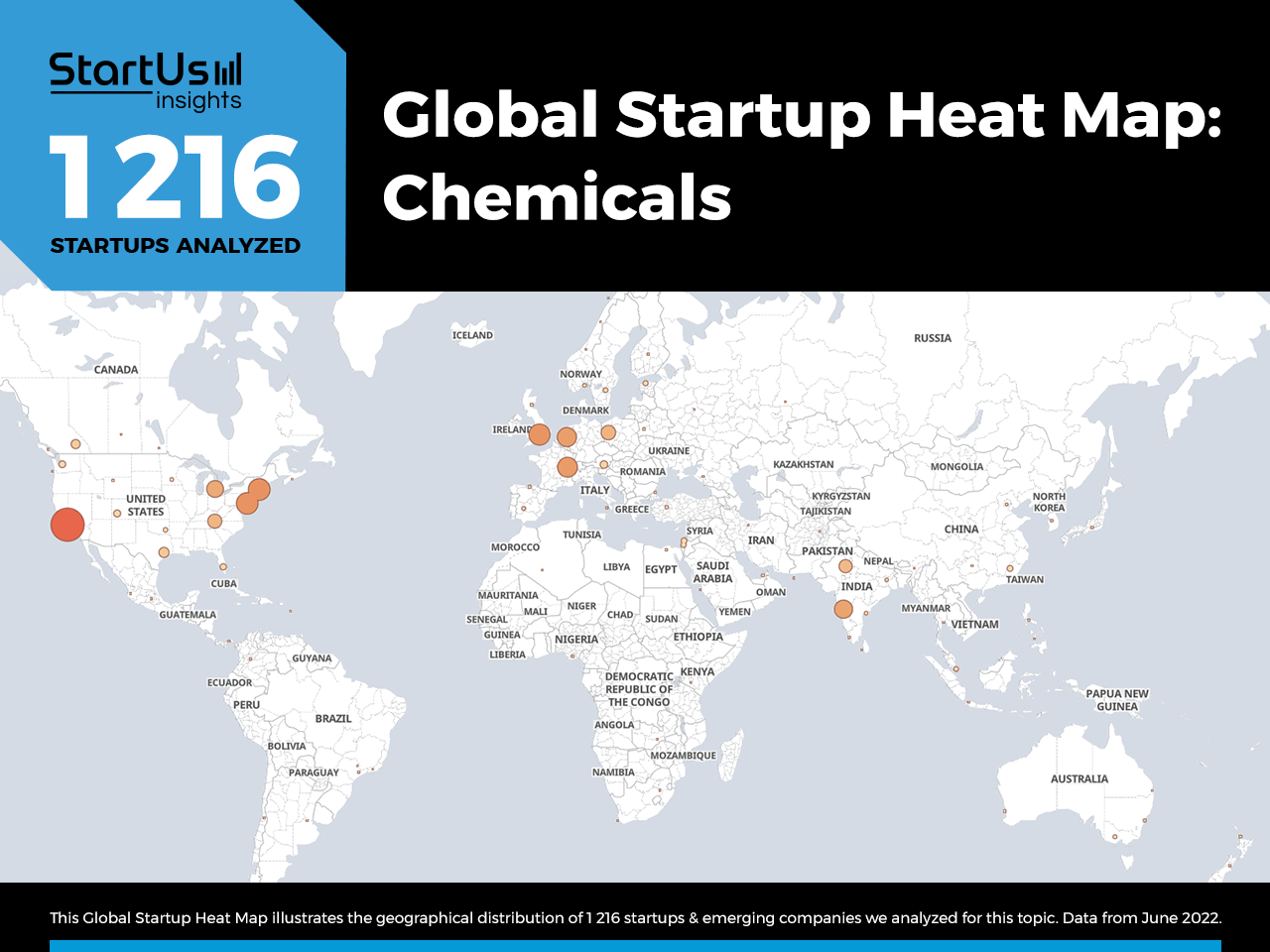Advancements in the chemical industry center on digitalization, decarbonization, and automation. Startups leverage various technologies to automate and make chemical manufacturing more sustainable. These trends highlight the direction of industry innovation in the coming years. For instance, IoT enhances connectivity between devices, improving material quality, asset performance, and worker safety. Additionally, real-time analytics and AI provide valuable insights to optimize production processes. However, extensive digitization and network connectivity also introduce significant cyber threats. To address this, the chemical industry adopts blockchain algorithms to secure data and supply chains.
This article was last updated in July 2024.
Top 8 Trends in the Chemicals Industry (2025)
- Advanced Manufacturing
- Innovative Materials
- Green Chemistry
- Internet of Things
- Data Analytics
- Artificial Intelligence
- Cloud Computing
- Blockchain
Innovation Map outlines the Top 8 Chemical Industry Trends & 16 Promising Startups
For this in-depth research on the Top Chemical Industry Trends and startups, we analyzed a sample of 1216 global startups & scaleups. This data-driven research provides innovation intelligence that helps you improve strategic decision-making by giving you an overview of emerging technologies in the chemicals industry. In the Chemical Industry Innovation Map below, you get a comprehensive overview of the innovation trends & startups that impact your company.
These insights are derived by working with our Big Data & Artificial Intelligence-powered StartUs Insights Discovery Platform, covering 4.7M+ startups & scaleups globally. As the world’s largest resource for data on emerging companies, the SaaS platform enables you to identify relevant technologies and industry trends quickly & exhaustively.

Want to explore all Chemical innovations & trends?
Tree Map reveals the Impact of the Top 8 Chemical Industry Trends
Based on the Chemicals Innovation Map, The Tree Map below illustrates the impact of the Top 8 Chemicals Trends in 2025. Innovation in IoT, AI, cloud computing, and data analytics drive the digitalization of the chemical industry. The most prevailing trend is Advanced Manufacturing, which includes technological advancements from immersive reality and robotics to digital twins.
Innovative materials form another significant trend, with developments spanning biochemistry and nanotechnology. Further, sustainable and green initiatives encourage the shift toward recycling and waste-to-energy solutions. Lastly, high cyber vulnerability calls for blockchain-based protection measures, which bring traceability and transparency to supply chains.
Global Startup Heat Map covers 1216 Chemicals Startups & Scaleups
The Global Startup Heat Map below highlights the global distribution of the 1216 exemplary startups & scaleups that we analyzed for this research. Created through the StartUs Insights Discovery Platform, the Heat Map reveals high startup activity in Europe and North America, followed by India.
Below, you get to meet 16 out of these 1216 promising startups & scaleups as well as the solutions they develop. These chemicals industry startups are hand-picked based on criteria such as founding year, location, funding raised, and more. Depending on your specific needs, your top picks might look entirely different.
Top 8 Chemical Innovation Trends in 2025
1. Advanced Manufacturing
Advancements in chemical manufacturing increasingly involve additive technologies, digitalization, and automation. Extended reality helps chemical engineers resolve workforce shortages and employee training. Together with digital twins, it simulates crisis production scenarios and diagnoses issues remotely. 3D printing also automates electrochemical device fabrication, digital synthesis, and novel materials development.
Further, cobots aid plant technicians in hazardous laboratory environments to speed up the production rate. Automated guided vehicles transport goods without human intervention. All these advancements make new chemical manufacturing innovations one of the top chemical industry trends.
Trillium Renewable Chemicals enables Green Manufacturing
US-based startup Trillium Renewable Chemicals manufactures plant-based acrylonitrile from sustainable feedstocks. Acrylonitrile is conventionally made from petroleum-based feedstock that emits enormous heat and produces poisonous cyanide. The startup’s patented technology replaces fossil raw materials with bio-renewable feedstocks. It involves thermochemical catalysis that does not need biology. The approach avoids the long-distance transportation of hazardous products, in addition to being cost-effective, health risk-free, and scalable.
Tree-Tower facilitates Smart Chemical Manufacturing
Tree-Tower is an Italian startup that develops innovative customized software for smart chemical manufacturing. The startup’s portfolio includes computer-aided engineering, machine learning, and digital twin solutions. It also offers sensor networks and big-data analytics. These technologies activate rapid prototyping, virtual testing of materials and components, as well as product design optimization. Moreover, Tree-Tower provides tools for additive manufacturing and advanced VR visualization as well. True Tower also ensures intellectual property (IP) protection using corporate software strategies.
2. Innovative Materials
The new and emerging innovative materials form trends around advanced battery materials, nanomaterials, and biotechnology. Biotech solutions overcome the negative effects of petrochemicals by producing bio-based batteries. Such advanced cathode materials increase batteries’ energy density and efficiency.
Another example is carbon fiber which extends the lifespan of blades in wind turbines. Also, nanotechnology investigates undiscovered materials such as polymers to improve smoothness and heat resistance for coatings. The chemicals industry benefits from new materials by reducing its carbon footprint and optimizing costs.
Polymerize predicts Material Properties
Singapore-based startup Polymerize utilizes ML models to forecast material properties before experiments. The platform provides insights on chemical formulations and data visualization. Thus, it improves decision-making for polymer businesses and accelerates R&D operations by adjusting the experiment’s structure and timeline. In this way, Polymerize enables products to reach the market faster.
Acoerela creates Water-soluble Lipophilic Dyes
Singapore-based startup Acoerela develops a platform of water-soluble lipophilic dyes that overcome the limitations of traditional dyes like poor solubility and aggregation. Its dyes come in various colors and find applications in labeling extracellular vesicles, bacteria, and mammalian cells.
For example, the startup’s gram-selective dye distinguishes between gram-positive and gram-negative bacteria based on differences in cell wall structure. These membrane dyes also allow for long-term cell tracking, over multiple generations, without toxicity. Acoerela is currently developing dyes that emit in the near-infrared II window, to enable non-invasive tumor imaging over extended periods in living mice.
3. Green Chemistry
Green chemistry focuses on processes and products that stop the impact of dangerous or hazardous chemicals and materials. This chemical trend pushes manufacturers to prioritize environmental regulations and sustainability. Producers install recycling technologies, enhance waste management, and move to alternative energy resources. For example, the transition from petroleum to plant-based feedstocks converts biomass into fuel. Another example is green hydrogen which transforms carbon dioxide (CO2) emissions into hydrocarbons. Further, green chemistry solutions substitute coke oven gas to decarbonize the steelmaking process.
Lignolix develops Lignin Upcycling Technology
Lignolix is a US-based startup that upcycles lignin from plant waste into high-performance specialty chemicals. Since lignin is difficult to process due to its smell, the startup’s technology breaks down lignin into small pieces while preserving its functional properties. This approach reduces odor and color challenges and is also compatible with other products. The end products are applicable in cosmetics, adhesives, flavorings, and fragrances and the Lignolix technology is easily scalable.
SusPhos offers Phosphate Waste Upcycling
SusPhos is a startup from Denmark that applies smart chemistry to upgrade phosphate-rich waste. The startup generates waste-free alternatives to products derived from fossils. SusPhos’s patented technologies provide sustainable phosphate products such as high-quality flame retardants and specialty fertilizers.
4. Internet of Things
The chemical industry implements IoT to capture and store operational data, as well as streamline processes. IoT also facilitates controlling material quality, asset performance, and worker safety. The acquired data simulates and predicts maintenance suggestions to prolong asset lifespan. For instance, operators use sensor measurements to avoid overheating, in turn, preventing unexpected shutdown and production losses. Finally, IoT unites original equipment manufacturers (OEMs), operators, and service providers on a single platform. This brings unprecedented transparency to chemical industry supply chains – making this a top chemicals trend.
Volatile analyzes Flavors using an Electronic Nose
Using AI and smart sensors, UK-based startup Volatile identifies flavors. The startup integrates analysis of flavor drivers, chemical composition screeners, and electronic nose devices. Its electronic nose, Scout2, is a metal-oxide gas sensor that detects odors and volatile organic gases. Moreover, Scout2 features a modular design compatible with other major sensor manufacturers. This device controls air quality and also monitors the ingredients of solids and liquids and operates irrespective of changing environmental conditions.
MantiSpectra develops a Chip Spectral Sensor
Mantispecta develops Near-Infrared (NIR) spectral sensors based on the Indium Phosphide platform. These sensors identify and quantify materials’ chemical information encoded at wavelengths. The computation is also completed in a fast, contactless, and non-invasive manner. Usually, traditional spectrometers are expensive and complex to use. Yet, Mantispectra’s portable mini sensors solve these challenges by fitting neatly into various devices.
5. Data Analytics
Advanced data analytics elevates productivity and profitability in chemical manufacturing. Insights from big data optimize energy consumption, plant operation, and supply chains. Additionally, sensors and wireless devices track the historical performance of manufacturing equipment. Based on this data, AI algorithms forecast potential failures and their root causes to decrease machinery downtime.
Meanwhile, supply chain analytics reduces costs in each step of manufacturing, from raw materials purchasing to end-user delivery. Moreover, producers can easily analyze weather patterns and predict events that cause a delay in the supply chain. Like in all industries today, the effects of digital operations and analysis significantly impact the chemical industry too.
MQS works on Quantum Chemistry Integration
Danish startup MQS combines quantum-based computational tools and thermodynamics modeling to calculate material properties. The startup accelerates R&D processes in the pharma, biotech, and chemical industry. The MQS software applies prediction models and algorithms to discover new materials for batteries and sustainable solvents, as well as new drugs and bio-degradable plastics.
agPlenus offers Computational Genomics
Israeli startup agPlenus delivers predictive technology to discover novel chemicals for crop protection. The startup’s target-based technology uses a virtual screening approach to rapidly compute the analysis of lots of molecular data. agPlenus incorporates genomics, AI, and big data to extend the chemicals library, as well as increase the probability of successful chemical product development.
6. Artificial Intelligence
In the context of the chemicals industry, AI and deep learning algorithms strengthen laboratory experiments and clinical trials. Such solutions generate new biochemical formulations and material combinations. For example, new molecules with healing properties or alternatives for dangerous or hazardous substances. Besides, AI automates chemical processes and collects valuable data to improve operational efficiency. AI solutions also instantly spot anomalies, leakages, or contamination and enable early prevention. These wide-ranging benefits and applications of AI make it a top chemical industry trend to follow.
Chemical.AI offers AI-based Synthesis Planning
Chinese startup Chemical.AI provides AI and cheminformatics for synthesis planning. The startup’s data-driven approach enables fast predictive retrosynthesis. It generates diverse routes and also discovers new ones. The AI-assisted design considers synthetic steps, level of synthetic difficulty, route feasibility, and synthetic strategies. Thus, the human-computer evaluation tool accelerates the R&D of innovative elements in pharmaceuticals.
Navigance delivers AI intelligence to manufacturing
Navigance is a German startup that offers an AI-driven SaaS platform. The platform digitalizes and optimizes chemical manufacturing processes. Navigance collects data from chemical plants and applies rapid cloud computing using AI and advanced analytics to spot anomalous patterns. Based on this data, Navigance sends predictive alerts and automatic recommendations. This improves process efficiency and production output while reducing energy consumption and developmental costs.
7. Cloud Computing
Since enforcing innovations is increasingly time-consuming, cloud computing is rapidly gaining traction. Cloud computing tools perform heavy calculations to find material and chemical compatibility. Also, a cloud-based solution is easily scalable and does not require large capital investments to deploy. Cloud data storage enables information storage and exchange in a flexible, safe, and quick manner. It also reduces operational costs and lowers supply chain risks. Another significant focus for cloud startups is cyber security since the industry works with highly sensitive data that contains information, for example, about chemical formulas.
Nextmol builds a Cloud-based Chemicals Design Lab
Nextmol is a Spanish cloud-based molecular modeling startup that utilizes AI to design new chemicals. The startup incorporates atomic-scale models and computational chemistry. It characterizes molecules, simulates hard-to-reach experiment conditions, and predicts the most promising molecules. Additionally, Nextmol identifies the causes of lab failures. To achieve fast and reliable results, the startup also offers high-performance cloud computing.
Fastone offers a Multi-Cloud Computing Platform
Fastone is a Chinese startup that develops cloud-based solutions for automotive, life sciences, and smart manufacturing. Based on the serverless and Application Defined Cloud (ADC) framework, Fastone builds a cheap, fast, and scalable computing platform. It is used for drug discovery and electronic design automation. The startup’s online computer-aided engineering simulation platform further allows HPC modeling on any device. It runs finite element analysis (FEA), computational fluid dynamics (CFD), and thermal analysis. Further, Fastone offers cloud platforms for bioinformatics and exploratory data analysis.
8. Blockchain
From raw materials to manufacturing, blockchain technology tracks chemical products. Moreover, it monitors even individual molecules at every step of the supply chain. Blockchain provides trusted data, an understanding of customer needs, and unexplored revenue models. Besides, it reveals consumption patterns to optimize demand planning. Thus, it eliminates overstocking, rushed orders, and scheduling challenges. Smart contracts further provide distributed and autonomous control to ensure quality and reduce errors during testing processes.
CircularTree provides a Circular Supply Chain Solution
CircularTree is a German startup that creates a circular supply chain. The startup’s blockchain-powered ecosystem simplifies supply chain sustainability (CSR) and compliance (ESG) responsibility. The transparent automation of workflows further eliminates the ambiguity between stakeholders. CircularTree makes the process of compliance management trustworthy. Further, its digital twin solution allows manufacturers to coordinate the logistics of chemical materials in real time.
Chemchain enables Chemicals Tracking
Brazilian startup Chemchain develops a SaaS blockchain platform. The platform tracks and transfers information along the chemical value chain. The startup’s decentralized approach protects data access to third parties through end-to-end encryption. Its algorithms also document historical information about raw materials, such as the presence of specific chemicals, time delays, extra expenses, and human errors. Chemchain allows customers to control confidential data and disclose it selectively, overcoming secure communication constraints.
Discover all Chemical Industry Trends, Technologies & Startups
These chemical industry trends stimulate digital transformation and sustainability while optimizing manufacturing processes and discovering new materials. These chemical solutions also build a connected and intelligent value chain that improves efficiency, profitability, and transparency across the industry.
The chemical trends and startups outlined in this report only scratch the surface of trends that we identified during our data-driven innovation & startup scouting process. Identifying new opportunities & emerging technologies to implement into your business goes a long way in gaining a competitive advantage.











